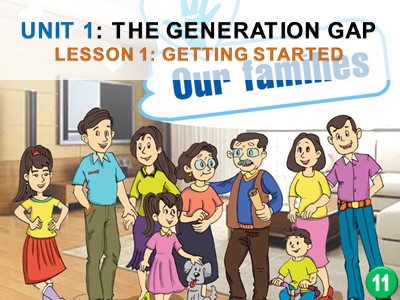Bài giảng Tiếng Anh 11 - Unit 1: The generation gap - Lesson 1: Getting started

extended family (n)
nuclear family (n)
childcare (n)
hairstyle (n)
generation gap (n)
appearance (n)
belief (n)
table manner (n)
chores (n)
Bạn đang xem tài liệu "Bài giảng Tiếng Anh 11 - Unit 1: The generation gap - Lesson 1: Getting started", để tải tài liệu gốc về máy bạn click vào nút DOWNLOAD ở trên
UNIT 1: THE GENERATION GAPLESSON 1: GETTING STARTED11Warm up What are the differences between you and your parents ?EntertainmentMusic/ filmsLifestyleFashion/ Ways of shoppingWays of thinking/Values of lifeStudying/ jobs-careerCommunicationWhy are there differences?These differences are created by the gap between generationsVocabularyextended family (n) nuclear family (n)childcare (n)hairstyle (n)generation gap (n)appearance (n)belief (n)table manner (n)chores (n)gia đình đa thế hệgia đình hạt nhânkiểu tócchăm sóc trẻ emkhoảng cách thế hệniềm tincung cách, cư xửcông việc ngoại hìnhVocabularyconservative (a)state-owned (n)footsteps (n)viewpoint (n)open-minded (a)to impose (+on) (n)conflict (n)relationship (n)bảo thủsở hữu nhà nướcquan điểmbước châncởi mởxung độtmối quan hệáp đặtLISTEN AND READActivity 2. Read the conversation again. Are the following sentences true (T) or false (F)1Sam is part of an extended family.2Ann is part of a nuclear family.3Ann's grandparents look after their grandchildren.4Ann's grandma thinks that all family members should share housework.5Ann's grandpa wants her to do the same job and things in life as he did.TFnuclearextendedparents thinkActivity 3. Complete the following definitions, using the highlighted compound nouns in the conversation.1. A(n)_______________ is a family that consists of parents and children.2. __________ is the care of children, especially while parents are at work.3. A(n)______________ is the difference in attitudes or behaviour between younger and older age groups, which can cause a lack of understanding.4. _____________ are the rules of behaviour that are typically accepted while people are eating at a table.5. A(n)_________ is a person's opinion about a subject.6. A(n)_______________ is a big family that includes not only the parents and children, but also grandparents, uncles, aunts and cousins, all living under the same roof.nuclear familyChildcaregeneration gapTable mannersviewpointextended familyActivity 4. Find other compound nouns in the conversation. Use a dictionary to look up their meanings, if necessary.grandparents, grandma, grandpa, grandmother, hairstyles, housework, footstepsActivity 5. Read the conversation again and find verbs used to express duty, obligation, advice, or lack of obligation.Opinion & advice.Duty & obligation: Lack of obligation: should and ought to in positive and negative forms.must and have to.(not)have to,(not) need toActivity 6. Work in pairs. Ask and answer the following questions.1. Are you part of a nuclear or an extended family? I am part of a nuclear / an extended family.2. What do you like and dislike about your type of family?Extended family- Pros: During childhood: get chance to hear a good night stories from your grandparents; have your cousins to play with; have your uncles/aunts to ask for money whenever your parents refuse or to have an eye on you when parents are at work. Becoming teenage and mature: learn moral values from elders, receive help, given useful advice, taken care of and supported whenever you are in need.Cons: Need to follow family norms; might have less privacy; can't make your own decisions because you have to ask everyone before taking big step; get in conflicts because of differences and disagreements in lifestyles and perception.Nuclear family- Pros: Have more privacy; make your own decisions; don’t need to share things; don’t have much potentiality of differences and disagreements which may lead to conflicts. Cons: Less people to talk to; probably no one to seek help in certain situations; constant feeling of solitude; lack of proper direction and guidance; too many responsibilities on a single bread earner; children grow up being introvert and participate in less social events..HomeworkLearn vocabulary by heart.Redo exercises.Prepare the next lesson: Language15Bài giảng PPT tiếng Anh 11 For even more PPT presentations and great resources visit:
Tài liệu đính kèm:
 bai_giang_tieng_anh_11_unit_1_the_generation_gap_lesson_1_ge.pptx
bai_giang_tieng_anh_11_unit_1_the_generation_gap_lesson_1_ge.pptx



